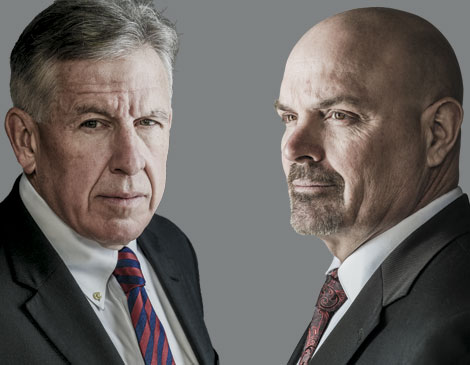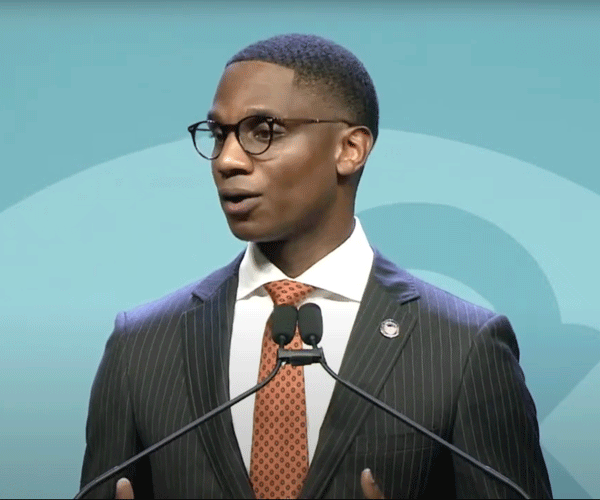"I will make it right," McGinty said in his TV ad.
Voters, weary of the county corruption scandal, bought the pitch. McGinty, a judge, blew away four opponents in the Democratic primary and got the prosecutor's job. Since then, McGinty has been the stubborn maverick, displaying pugnacity at press conferences in his signature staccato growl.
But plenty of critics say he hasn't made things right at all. From the Tamir Rice and Michael Brelo cases to feuds with judges, McGinty's bullheaded style has made enemies who want to see him defeated by challenger Michael O'Malley in the March 15 election.
For some, McGinty's performance on the Rice case is the top issue in the prosecutor's race. They're furious at him for recommending the grand jury decline to bring criminal charges against Timothy Loehmann, the police officer who killed 12-year-old Rice, or his partner, Frank Garmback. They think McGinty manipulated the grand jury toward his preferred conclusion.
McGinty argues the recommendation was based on U.S. Supreme Court decisions that make it very difficult to prosecute police for killing on duty. He says the officers made reasonable decisions based on the bad information they got from the dispatcher, who led them to believe they were facing an adult with a real gun, not a kid with a toy.
"They go thinking they're saving lives," McGinty says. "They took an aggressive approach toward a man pointing a gun at people in a park next to a rec center. ... He had a hat on that obscured his face, and he was the size of an adult."
Critics have blasted McGinty's choice of expert witnesses, all of whom found the shooting justified, and his release of their reports, a break with grand jury custom. He says he chose respected experts and released their findings in a spirit of openness.
"I believe in transparency," he says.
The McGinty-O'Malley race is not a clear contest about which candidate will be tougher on police who kill. For the November 2012 deadly mega-chase and shooting, McGinty won indictments of six Cleveland officers — Michael Brelo, found not guilty of voluntary manslaughter, and five supervisors, who still face dereliction of duty charges.
While prosecuting Brelo, McGinty antagonized Cleveland's police union just as he angered Rice family supporters: with strategic releases of expert reports and questioning of the other side's aims.
McGinty argues police reform goes deeper than indictments or guilty verdicts. "Since the Brelo case, there've been no more high speed chases," he says. "Officers' lives and others' have been protected."
As for Rice's death, "I hope there are many lessons from it regarding hiring [and] tactics," he says. "The basic reform should be with the police and dispatch."
He's proposed changing Ohio law to require an outside agency to investigate police deadly force cases and to allow prosecutors to refer them to the attorney general.
The prosecutor's race, McGinty argues, should be about whether he's fulfilled his promises to improve the criminal justice system, increase its transparency and take politics out of the office.
"We've set a different tone," he says. "We do not do any patronage. All the hiring is done by committee."
He banned employees from running for elected office, a sharp break with his predecessor, Bill Mason, who encouraged his employees to run. McGinty calls the Mason-era office "a political patronage machine run by my opponent" — a reference to O'Malley's more than five years as Mason's first assistant. (O'Malley has said he'll keep the politics ban.) McGinty says he's increased the number of minority prosecutors by 53 percent and female prosecutors by 20 percent.
Carrying out 2012 campaign pledges, McGinty has set up a public corruption unit and a conviction integrity unit, which reviews past cases for error. The corruption unit's record is mixed. Most of the unit's charges against former Bedford Judge Harry Jacob III fell apart in court. But its successful prosecution of attorney Anthony Calabrese III for bribing his way to inside info on the 2005 Ameritrust complex purchase provided the only answers the public will likely get on whether the infamous deal for the skyscraper was corrupted.
The conviction integrity unit has reviewed 89 cases and reversed none. But McGinty has reconsidered other cases: He recommended a death row inmate's execution be stayed and he dropped murder charges against three men, freeing two of them after 39 years in prison and expunging the other's record, because a witness recanted.
McGinty's efforts to improve the justice system have often devolved into feuds with local judges.
"I love judges," McGinty says. "But if a judge makes an error and doesn't bring a case to trial, I'm going to do something about it."
What do people see when they look at Michael O'Malley, the challenger in the Cuyahoga County prosecutor's race? To some supporters, O'Malley is the anybody-but-McGinty candidate, a vehicle to protest the incumbent prosecutor's handling of the Tamir Rice case. To many opponents, O'Malley is the second coming of Bill Mason and Pat O'Malley, his former boss and his brother respectively, who ran their offices as political machines.
O'Malley says he's neither: He's his own man, and the Rice case is just one example of dysfunction in the prosecutor's office under Tim McGinty. "I just don't feel the office is heading in the right direction," O'Malley says. "The confidence of the employees and the community has started to wane."
A former Cleveland city councilman and savvy political striver, O'Malley served as Mason's first assistant prosecutor and has run unsuccessfully for local judgeships. He is taking a surprisingly activist tone for a former insider, promising justice system reforms and a community listening tour. O'Malley projects a mix of chummy enthusiasm and professional caution, perhaps calibrated for contrast with McGinty's gruff bluntness.
U.S. Rep. Marcia Fudge endorsed O'Malley in December, saying she'd lost confidence in McGinty over the Rice case. Yet O'Malley also stands to gain votes from police supporters angry at McGinty's bitter battle to prosecute officer Michael Brelo for voluntary manslaughter in the Nov. 2012 deaths of Timothy Russell and Malissa Williams.
O'Malley has taken a painstakingly neutral stance on police deadly force issues. He critiques how McGinty handled the Rice grand jury (allowing the police to read statements yet avoid questions, for instance), but O'Malley won't say whether he thinks the officers broke the law. He also would've brought the Rice case before a grand jury, O'Malley says, but he would have offered no recommendation on whether killing the 12-year-old was justified or criminal.
"I would've presented the facts of the case and the evidence [and] let the grand jurors make a decision," he says.
O'Malley wants to get police deadly force cases out of the prosecutor's office entirely. Prosecuting police and attacking their credibility, when they're the state's witnesses in nearly all other criminal trials, is "a difficult situation, almost a conflict situation," O'Malley says. He thinks Ohio should pass a law to put the state attorney general in charge of all police deadly force investigations and prosecutions. Failing that, he says, he'd refer all such cases to special prosecutors.
O'Malley worked as a Parma assistant law director in the '90s and represented Old Brooklyn on Cleveland City Council from 1999 to 2005. From 2007 to 2012, he was first assistant to then-county prosecutor Mason, implementing his policies day to day.
Opponents fear O'Malley will revive the political machine once headed by Mason and Pat O'Malley, his older brother and former county recorder. Both were known for patronage hiring of employees, who often ran for local office. Critics also question why O'Malley's former boss didn't catch the political corruption of fellow Democrats Jimmy Dimora, Frank Russo and their cronies.
"I am my own person, my own man," O'Malley replies. "This is the last office I will ever run for." He says he'll continue McGinty's ban on prosecutor's employees becoming candidates. "I am not into constructing some kind of political army. I don't need to."
Neither Mason nor his brother are involved in his campaign, he says. "I haven't talked to my brother in months."
O'Malley counterpunches on the political corruption issue by highlighting McGinty's friendship with Benny Bonanno, the former court clerk convicted of corruption in 1996. (Bonanno worked on several political campaigns out of his clerk's office, including McGinty's.) O'Malley says he will keep McGinty's public corruption unit "if there's a need."
O'Malley also distances himself from two aspects of Mason's record that made his old boss unpopular among African-Americans: his aggressive charging of the death penalty and low-level drug cases. But his biggest motivation for running is undoing the way McGinty leads the prosecutor's office.
After working for McGinty as a supervisor for 2 1/2 years, O'Malley left to spend seven months as Parma's safety director. He claims veteran attorneys are leaving McGinty's office, fed up with his decisions and management style. "Many prosecutors are concerned about his handling of cases," O'Malley says. (Stats released by McGinty's office suggest attorney turnover is about the same as under Mason; O'Malley calls the figures misleading.)
McGinty tries to win at all costs, obsessively courts local media and manipulates cases for self-promotion, argues O'Malley. He says the prosecutor tainted the Rice grand jury process by releasing expert reports. As a judge, he points out, McGinty stepped down from serial killer Anthony Sowell's case after leaking Sowell's psychiatric evaluation to the press.
O'Malley argues he can collaborate better than McGinty. He wants to bring county judges back to a judicial reform panel; they quit last fall, disagreeing with McGinty's agenda. "They just pulled the plug, saying we're not going to be bullied anymore," O'Malley says.




